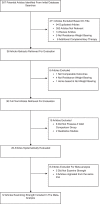A systematic review and meta-analysis of strength training in individuals with multiple sclerosis or Parkinson disease
- PMID: 25634170
- PMCID: PMC4602948
- DOI: 10.1097/MD.0000000000000411
A systematic review and meta-analysis of strength training in individuals with multiple sclerosis or Parkinson disease
Abstract
Strength training has, in recent years, been shown to be beneficial for people with Parkinson disease and multiple sclerosis. Consensus regarding its utility for these disorders nevertheless remains contentious among healthcare professionals. Greater clarity is required, especially in regards to the type and magnitude of effects as well as the response differences to strength training between individuals with Parkinson disease or multiple sclerosis. This study examines the effects, magnitude of those effects, and response differences to strength training between patients with Parkinson disease or multiple sclerosis. A comprehensive search of electronic databases including Physiotherapy Evidence Database scale, PubMed, EMBASE, Cochrane Central Register of Controlled Trials, and CINAHL was conducted from inception to July 2014. English articles investigating the effect of strength training for individuals with neurodegenerative disorders were selected. Strength training trials that met the inclusion criteria were found for individuals with Parkinson disease or multiple sclerosis. Individuals with Parkinson disease or multiple sclerosis were included in the study. Strength training interventions included traditional (free weights/machine exercises) and nontraditional programs (eccentric cycling). Included articles were critically appraised using the Physiotherapy Evidence Database scale. Of the 507 articles retrieved, only 20 articles met the inclusion criteria. Of these, 14 were randomized and 6 were nonrandomized controlled articles in Parkinson disease or multiple sclerosis. Six randomized and 2 nonrandomized controlled articles originated from 3 trials and were subsequently pooled for systematic analysis. Strength training was found to significantly improve muscle strength in people with Parkinson disease (15%-83.2%) and multiple sclerosis (4.5%-36%). Significant improvements in mobility (11.4%) and disease progression were also reported in people with Parkinson disease after strength training. Furthermore, significant improvements in fatigue (8.2%), functional capacity (21.5%), quality of life (8.3%), power (17.6%), and electromyography activity (24.4%) were found in individuals with multiple sclerosis after strength training. The limitations of the study were the heterogeneity of interventions and study outcomes in Parkinson disease and multiple sclerosis trials. Strength training is useful for increasing muscle strength in Parkinson disease and to a lesser extent multiple sclerosis.
Conflict of interest statement
The authors have no conflicts of interest to disclose.
Figures
Similar articles
-
Effects of Strength Training Using Unstable Surfaces on Strength, Power and Balance Performance Across the Lifespan: A Systematic Review and Meta-analysis.Sports Med. 2015 Dec;45(12):1645-69. doi: 10.1007/s40279-015-0384-x. Sports Med. 2015. PMID: 26359066 Free PMC article.
-
Physical exercise training interventions for children and young adults during and after treatment for childhood cancer.Cochrane Database Syst Rev. 2016 Mar 31;3(3):CD008796. doi: 10.1002/14651858.CD008796.pub3. Cochrane Database Syst Rev. 2016. PMID: 27030386 Free PMC article.
-
Exercise therapy for fatigue in multiple sclerosis.Cochrane Database Syst Rev. 2015 Sep 11;2015(9):CD009956. doi: 10.1002/14651858.CD009956.pub2. Cochrane Database Syst Rev. 2015. PMID: 26358158 Free PMC article.
-
Effects of Supervised vs. Unsupervised Training Programs on Balance and Muscle Strength in Older Adults: A Systematic Review and Meta-Analysis.Sports Med. 2017 Nov;47(11):2341-2361. doi: 10.1007/s40279-017-0747-6. Sports Med. 2017. PMID: 28573401
-
Exercise interventions on health-related quality of life for people with cancer during active treatment.Cochrane Database Syst Rev. 2012 Aug 15;2012(8):CD008465. doi: 10.1002/14651858.CD008465.pub2. Cochrane Database Syst Rev. 2012. PMID: 22895974 Free PMC article.
Cited by
-
Effectiveness of Blood Flow Restriction in Neurological Disorders: A Systematic Review.Healthcare (Basel). 2022 Nov 30;10(12):2407. doi: 10.3390/healthcare10122407. Healthcare (Basel). 2022. PMID: 36553931 Free PMC article. Review.
-
Time course of strength adaptations following high-intensity resistance training in individuals with multiple sclerosis.Eur J Appl Physiol. 2017 Apr;117(4):731-743. doi: 10.1007/s00421-017-3534-z. Epub 2017 Mar 1. Eur J Appl Physiol. 2017. PMID: 28251398 Clinical Trial.
-
Staying Strong Toolbox: Co-design of a physical activity and lifestyle program for Aboriginal families with Machado-Joseph disease in the Top End of Australia.PLoS One. 2021 Feb 5;16(2):e0244311. doi: 10.1371/journal.pone.0244311. eCollection 2021. PLoS One. 2021. PMID: 33544709 Free PMC article.
-
Strength training for people with multiple sclerosis and the current recommendations.Br J Neurosci Nurs. 2021 Jul 1;17(Sup3):S32-S41. doi: 10.12968/bjnn.2021.17.Sup3.S32. Epub 2021 Aug 3. Br J Neurosci Nurs. 2021. PMID: 38736990 Free PMC article.
-
Effect of exercise therapy on quality of life of patients with multiple sclerosis in Iran: a systematic review and meta-analysis.Neurol Sci. 2017 Nov;38(11):1901-1911. doi: 10.1007/s10072-017-3047-x. Epub 2017 Jul 7. Neurol Sci. 2017. PMID: 28687973
References
-
- Nance MA. Therapy in Huntington's disease: where are we? Curr Neurol Neurosci Rep 2012; 12:359–366. - PubMed
-
- Lin MT, Beal MF. Mitochondrial dysfunction and oxidative stress in neurodegenerative diseases. Nature 2006; 443:787–795. - PubMed
-
- Olanow CW, Stern MB, Sethi K. The scientific and clinical basis for the treatment of Parkinson disease (2009). Neurology 2009; 72 suppl 4:S1–S136. - PubMed
-
- Mitchell JD, Borasio GD. Amyotrophic lateral sclerosis. Lancet 2007; 369:2031–2041. - PubMed
-
- Benedict RH, Zivadinov R. Risk factors for and management of cognitive dysfunction in multiple sclerosis. Nat Rev Neurol 2011; 7:332–342. - PubMed
Publication types
MeSH terms
Substances
LinkOut - more resources
Full Text Sources
Medical
Miscellaneous



